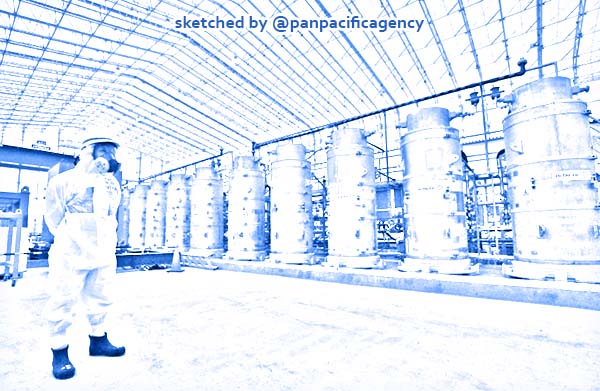Japan decides to release water from Fukushima nuclear plant into sea

In this Nov. 12, 2014, file photo, a Tokyo Electric Power Co. (TEPCO) official wearing radioactive protective gear stands in front of Advanced Liquid Processing Systems during a press tour at the Fukushima Dai-ichi nuclear power plant in Okuma, Fukushima Prefecture, northeastern Japan. (AP Photo/Shizuo Kambayashi). Sketched by the Pan Pacific Agency.
TOKYO, Apr 13, 2021, Kyodo. The Japanese government decided Tuesday to release treated radioactive water accumulating at the crippled Fukushima Daiichi nuclear power plant into the sea, having determined it poses no safety concerns to humans or the environment despite worries of local fishermen and neighboring countries, The Mainichi reported.
Prime Minister Yoshihide Suga met with members of his Cabinet including industry minister Hiroshi Kajiyama to formalize the decision, which comes a decade after a massive earthquake and tsunami triggered a triple meltdown in March 2011.
Water pumped into the ruined reactors at the Fukushima plant to cool the melted fuel, mixed with rain and groundwater that has also been contaminated, is treated using an advanced liquid processing system, or ALPS.
The process removes most radioactive materials including strontium and cesium but leaves behind tritium, which poses little risk to human health in low concentration. The water is being stored in tanks on the plant’s premises — more than 1.25 million tons in total.
Plant operator Tokyo Electric Power Company Holdings Inc. expects to run out of storage capacity as early as fall next year, and the government had been looking for ways to safely dispose of the tritiated water.
“Disposing of the treated water is an unavoidable issue in decommissioning the Fukushima Daiichi plant,” Suga said at the meeting, adding the plan will be implemented “while ensuring that safety standards are cleared by a wide margin and firm steps are taken to prevent reputational damage.”
A Ministry of Economy, Trade and Industry subcommittee concluded in February 2020 that releasing the tritiated water into the sea and evaporating it were both realistic options, with the former more technically feasible.
The International Atomic Energy Agency has backed the move, with Director General Rafael Grossi saying it is scientifically sound and in line with standard practice in the nuclear industry around the world.
According to the government’s plan, the tritium will be diluted to 1,500 becquerels per liter, one-40th of the concentration permitted under Japanese safety standards and one-seventh of the World Health Organization’s guideline for drinking water.
Suga said the IAEA and other third parties will be involved in the plan, ensuring it is carried out with transparency.
It will take around two years until the tritiated water is actually released into the sea due to the need to build new facilities and conduct safety screenings.
The government had initially hoped to make the decision last October, viewing it as necessary to clear up space at the Fukushima plant in order to move forward with the decades-long decommissioning process, but decided it needed more time to convince local fishermen who have voiced strong opposition.
Hiroshi Kishi, head of the national federation of fisheries cooperatives, reiterated that position and called for measures to prevent consumers from rejecting seafood caught in the area when Suga met with industry representatives last week.
China and South Korea have also expressed worries over the impact of discharging tritium into the environment.
The Chinese Foreign Ministry said Monday it formally relayed its “serious concern” to Japan following media reports the government was set to make the decision, urging Tokyo not to “overlook or shrug off” criticism from the international community.
A spokesman for the South Korean Foreign Ministry said releasing the tritiated water would “directly and indirectly affect the safety of the people and the neighboring environment.”
China and South Korea are among 15 countries and regions that continue to restrict imports of Japanese agricultural and fishery products due to the Fukushima disaster.